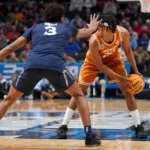
Why is the National Hockey League compelling its athletes to become activists?

I know we are collectively incapable of nuance, but let’s try it anyway.
Professional sports needs to really think hard about why they are forcing players to become activists while they are doing their jobs as athletes.
The NHL, specifically, is playing a weird, Orwellian game right now. The latest incarnation of activism in the NHL is asking players to wear Pride jerseys, and then watching them get dunked on if they say no. And no, it doesn’t matter what the issue happens to be, because the principle is the compelled activism, not the issue itself.
But the jerseys promote inclusivity, James. Again, that’s not the point.
Video proof Eric Staal is not a smart person. pic.twitter.com/6YQrDgpBOm
— Dean Blundell🇨🇦 (@ItsDeanBlundell) March 25, 2023
Eric and Mark Staal, not exactly the two brightest bulbs in the NHL, are still the two latest victims of compelled activism, after refusing to wear Pride jerseys and citing their religious beliefs as the reason to decline the NHL’s attempt to virtue-signal to its fans, and I suppose the LGBTQ communities.
But this is about respecting the lives of those why have fought for their rights, James. No, this is about requesting something from players, and then dismantling them publicly if they refuse.
Florida Panthers forward Eric Staal and defenceman Marc Staal did not wear the team’s Pride Night warmup jerseys prior to Thursday’s game against the Toronto Maple Leafs, citing their religious beliefs. https://t.co/o7QvfJz2y2
— TSN Hockey (@TSNHockey) March 23, 2023
I know you want to reflexively pivot back to the idea that refusing to wear the jersey means you are a horrible person, and the Staal brothers and James Reimer may be horrible people, but that doesn’t make the entire stunt a fruitful exercise. Politicizing sports might seem worthwhile but only if you are a fan of the issue being promoted.
There are a ton of things that seem amazing on the surface, but once you compel people to agree with you, often about things that nobody would have known about otherwise, you’ll always find outliers.
Let’s make a list of seemingly worthwhile issues and ask ourselves how our reaction might change if the NHL compelled players to support these issues, but refused to.
Freedom of Religion: Another mainstay of a democratic society is the freedom of religion. If the NHL wanted all their players to wear a jersey symbolizing the idea of supporting anyone who believes in omnipotent beings, should a player be criticized for saying no?
What about PETA? After all, they love animals and don’t want to torture them. Sounds amazing, right?
What about abortion? Everyone wants women to have control over their bodies, but maybe a player feels like abortion is cruel and unusual. Do they have to agree with the NHL on all of these issues?
Aside; I’m an atheist who is pro-choice, I love animals, and I love gay people. It’s not about the issue being promoted. That’s almost irrelevant. The greater point is that the NHL is manufacturing controversies by injecting politics into their game and then pointing at players who won’t play along with those games.
The biggest reason why more people aren’t saying this out loud is because these players are hiding behind religion, which is both disgusting and completely justifiable given the status of religion as an actual right in our society. The NHL is trying to make a statement by promoting the human rights and dignity of a marginalized group, and then watching their employees get chewed in the media and on social media for a problem they did not create in the first place.
"I am under the stern belief that we should have never known his stance on this issue. In fact, none of us should ever know the precise position of an athlete’s social justice barometer, unless the athlete feels like sharing it with us."https://t.co/ByhvXs4yib
— James DiFiore (@jamesdifiore) March 19, 2023
We are good at nuance in certain situations. When we heard people say “All Lives Matter’ many of us understood the nuance immediately – sure, technically all lives do matter, but we are talking about black lives for a reason right now. Every rational person understood that nuance.
Similarly, those of us with a working brain knew that Colin Kaepernick wasn’t kneeling on the memory of fallen soldiers, or disrespecting the country as a whole when he took a knee. What he was doing was raising awareness over the loss of black lives by law enforcement.
Nuance.
In this situation, the nuance is the underlying principle of a sports league giving players ultimatums. It isn’t about the issue. I repeat, the issue is not what’s important.
The nuance is that if we support professional leagues making an offer to their players that they can’t refuse under the fear of reprisals, then we don’t actually care about the issue at all – we just care about the appearance of a unified front.
Did I mention these are athletes, not activists?
The Black Power Salute
Mexico City, 1968
To highlight racism and segregation, Tommy Smith and Jacob Carlos raise clinched fists and hang their heads down as the national anthem plays after the 200 meters race.
They were sent home in disgrace, but were feted as heros back home
1/3 pic.twitter.com/8efAAzJaAI— Natasha Ramarathnam (@nuts2406) December 31, 2019
Sports often transcends politics, but the most memorable examples of this – Tommy Smith and John Carlos at the 1968 Olympics, the aforementioned Colin Kaepernick and his iconic knee, Muhammed Ali and his refusal to join the war in Vietnam, Kareen Abdul-Jabbar boycotting the Olympics in 1968 to demonstrate against the ill treatment of African Americans – are all examples of athletes taking it upon themselves to use their status for an issue they thought was important.
In case anyone’s forgotten, the murder of Tyre Nichols by Memphis police officers is why Colin Kaepernick took a knee. pic.twitter.com/ns8OTxVtVb
— D Lindsey (@DLindsey5617) January 28, 2023
If we can detach ourselves for a moment and consider the precedent this compelled activism is creating, and unpack this issue properly, we should collectively understand that we are more proficient at creating problems than helping marginalized groups.
I would even take it a step further and suggest that by requesting activism and then throwing athletes who don’t want to be activists under the bus, we are probably creating more animosity than we are acceptance.
One last reminder – it isn’t about the issue. Trust me on this.








